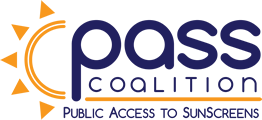May 12, 2014
Division of Dockets Management [HFA-305]
The Food and Drug Administration
5630 Fisheries Lane, Rm. 1061
Rockville, MD 20852
RE: Over-The-Counter Drug Monograph System—Past, Present, and Future; Public Hearing [Docket No. FDA-2014-N-0202]
Dear Commissioner Margaret Hamburg,
On behalf of the Public Access to SunScreens (PASS) Coalition, thank you for organizing this meeting to discuss aspects of the Over-The-Counter (OTC) Drug Review Process. The PASS Coalition applauds the FDA and HHS for its efforts to address the regulatory roadblocks currently facing OTC products that prevent timely market access.
Specifically, the PASS Coalition is concerned about the delays in the FDA review of pending time and extent applications (TEAs) for OTC sunscreen ingredients. The Coalition supports enactment of legislative reforms to the current TEA OTC sunscreen review process. The dramatic increase in the incidence of skin cancer has created a public health crisis and the PASS Coalition looks forward to working with FDA to reform this process as soon as possible.
Background
The PASS Coalition is a multi-stakeholder group formed to advocate for a regulatory pathway to market for new, safe and effective sunscreen ingredients. The Coalition includes organizations committed to skin cancer prevention and research, sunscreen ingredient and finished product manufacturers, and leading dermatologists. The purpose of the PASS Coalition is to develop reforms that guarantee a timely review by FDA of pending TEA OTC sunscreen ingredients. The Coalition’s goal is to work collaboratively with FDA, the White House, Congress, healthcare providers, consumer organizations and sunscreen manufacturers to establish a predictable and transparent process for pre-market approval of sunscreen components.
“”Which aspects of the OTC Drug Review Process are most in need of change?””
The following comments respond to the question, “”Which aspects of the OTC Drug Review Process are most in need of change?”” in the Federal Register request for comments.
The PASS Coalition believes that the TEA review process for sunscreen ingredients is an area “”most in need of change”” to help address rising skin cancer rates in the United States. Skin cancer has become a public health crisis in the United States. Today, skin cancer is the most common form of cancer in the United States. Each year there are more new cases of skin cancer, including melanoma, than the combined incidence of breast cancer, prostate cancer, lung cancer and colon cancer. Melanoma, which is the deadliest of the skin cancers as a result of its ability to move quickly and spread to distant organs in the body, is rising dramatically across the American population. In the United States each year, more than 76,000 Americans are diagnosed with melanoma, one every eight minutes, and more than 9,400 Americans die of melanoma, one every hour.
One of the risk factors for skin cancer, and specifically melanoma, is exposure to UV radiation. In fact, one blistering sunburn during childhood can double an individual’s chance of developing melanoma later in life.
Exposure to UV radiation includes both UVA and UVB rays. It was once believed that UVB was primarily responsible for skin cancer, but we now know that both UVA and UVB play important parts. UVA rays, in fact, are the most abundant source of solar UV radiation at earth’s surface and penetrate beyond the top layer of skin, while UVB rays are less abundant at the earth’s surface and penetrate less deeply into the skin. Furthermore, UVB rays are most prevalent in summer and during the middle of the day, but UVA rays are equally prevalent year-round. Finally, though UVB rays are the main cause of sunburn, UVA rays are the primary cause of premature skin aging. In short, both UVB and UVA are key factors in skin damage and skin cancer.
Regular use of broad spectrum sunscreen is an effective way for people to protect themselves against UVA and UVB rays. Compared to residents of other countries, American consumers have limited choices when it comes to broad-spectrum sunscreen products. This can be attributed, at least in part, to FDA’s decade-long delay regarding eight new sunscreen ingredient applications. Sunscreen technology currently awaiting approval before FDA has been widely available in Europe, Asia, Central and South America, in some cases for over 15 years. Moreover, the lack of a predictable, transparent and timely review process for new sunscreen ingredients in the U.S. is a disincentive to innovation. At a time when the incidence of skin cancer has reached epidemic proportions, it is imperative for Americans to have access to the latest safe and effective sunscreen products available. Through greater choice and proper application, sunscreen is a valuable tool needed to battle the public health risks posed by skin cancer.
FDA plays an integral role in the battle against skin cancer. The Agency is responsible for ensuring the safety and effectiveness of all drugs, including medical claims related to sunscreens and sunscreen ingredients.
As you know, in January 2002, FDA published a final rule establishing the TEA process to consider new applications for OTC products that were not covered by existing OTC monographs. FDA estimated that it would take 90-180 days to evaluate a TEA application’s eligibilityand estimated it would approve approximately 30 new OTC products each year under the TEA process. See 67 Fed. Reg. 3065, 3072. Despite a number of sunscreen applications pending FDA review and approval, FDA has not completed the review of any new sunscreen ingredients under its existing OTC process since the 1990s.
The PASS Coalition would like to work collaboratively with FDA and Congress to reform the sunscreen approval process and remove any regulatory impediments to approving new safe and effective sunscreen products in the United States. The Coalition is closely following the bipartisan, bicameral Sunscreen Innovation Act (H.R. 4250 / S.2141) introduced by Senators Jack Reed (D-RI) and Johnny Isakson (R-GA), and Congressmen Ed Whitfield (R-KY) and John Dingell (D-MI). The PASS Coalition supports efforts to create a predictable, transparent and timely review process for sunscreen ingredients, and addressing the growing public health concern associated with skin cancer.
Conclusion
The PASS Coalition urges FDA to work with Congress and stakeholders to enact legislative reforms to the sunscreen approval process. The Coalition looks forward to continuing to work with FDA to develop final legislative reforms that ensure new sunscreen ingredients receive a transparent and timely pre-market review. This will allow Americans to have access to the latest sunscreen technology to address the growing skin cancer rates.
Should you have any questions, please do not hesitate to access the Coalition website (www.passcoalition.com) for more information or contact me at (202) 457-7143 and rich.gold@hklaw.com. Thank you.
Sincerely,
Rich Gold
It is not really easy to arrange cash through other external resources, ordinarily to deal with health care needs. Finally there isn’t anything you can’t purchase on the Web anymore. A lot of drugs are used to treat ailments such as hair loss. Many patients think about http://finasteride.me/finasteride-dosage.html. What do you have to study about propecia generic? Several websites describe it as finasteride dosage. Alopecia describes loss of hair, that can occur at any age. After all, there is a wide range of possible explanations and heartiness care providers are usually able to pinpoint your problem through tests. First of all, only your health care professional can decide if Finasteride or other remedy is good for you. So, ordering medicaments from Internet can save time, but keep these safety tips in mind.

